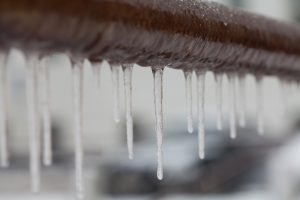 Overall, our winter was relatively mild this year, with the coldest of temperatures lasting just a few days at a time. Still though, we did have freezing temperatures, and with freezing weather comes frozen pipes.
Overall, our winter was relatively mild this year, with the coldest of temperatures lasting just a few days at a time. Still though, we did have freezing temperatures, and with freezing weather comes frozen pipes.
Hopefully, you did what you could to prevent this problem from affecting your household. For example, one preventive step you might have taken was to open any outdoor faucets used for sprinklers and hoses, and turned off all water flow to these points. After all, the pipes located outside are, understandably, the ones most susceptible to freezing, and leaving the faucets opened helps water to drain from them.
“Should I Worry If I Took Preventive Measures?”
There are a number of pipes in your home that are vulnerable to freezing even if they aren’t outside. This includes plenty of pipes that have to remain in use all winter long—pipes under your sinks, in crawlspaces, and even in basements. In order to thoroughly protect these pipes, we advise that you insulate them using sleeves that can be found at any hardware store.
But this isn’t a 100% guarantee that your pipes won’t freeze. And if yours did, then it’s time to call in a professional plumber in Waverly, IA. Frozen pipes are a bigger deal than many homeowners realize—water won’t flow, your pipes are at risk of bursting, and you can find yourself facing a huge plumbing repair nightmare, plus significant property damage.
The Danger of Burst Pipes
Water expands in volume when it freezes, since the molecular structure of ice is different than liquid water (it’s hexagonal in shape). So it takes up a lot of space in your plumbing—but that alone isn’t what causes frozen pipes to burst. It’s certainly part of it, but what causes the pipes to burst is the pressure buildup that occurs during the freezing process.
The water freezes and expands, while pushing out any remaining water. But if your faucets are closed, there’s nowhere for the water to go, thus creating more and more pressure—eventually this leads to lateral bursting along your pipes.
“Can I Thaw My Pipes Myself?”
There have been too many stories of homeowners trying to thaw frozen pipes only to end up with a flooding mess, property damage, and even injury. That’s because the risk of burst pipes is actually higher during the thawing process than the freezing process.
Do not use a hair dryer (this is ineffective at best, and can lead to electrocution at worst), a space heater, or a blow torch (yes, people have tried it). The best thing you can do is to give a professional plumber a call. With years of experience and specialized tools, we can effectively thaw your pipes without any danger to your property or any person in your household.
What you can do, to relieve pressure on your frozen pipes until our plumbers can get there, is open up any faucets at the end of your frozen pipes. You may be able to prevent ruptured plumbing this way.
At Dalton Plumbing, Heating, Cooling, Electric and Fireplaces, Inc., your comfort is our promise! To set up an appointment, give us a call at the number above, email customerservice@daltonphc.com or schedule an appointment online.
